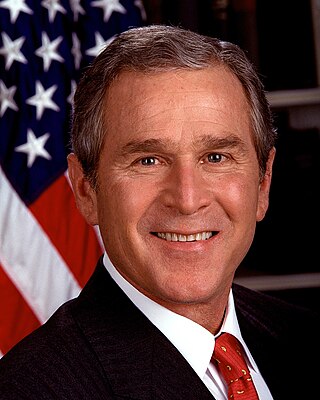
James Stuart Gilmore III is an American politician, statesman, diplomat, and former attorney who served as the 68th Governor of Virginia from 1998 to 2002. A member of the Republican Party, Gilmore also chaired the Republican National Committee in 2001 and served as the U.S. Ambassador to the Organization for Security and Cooperation in Europe during the Trump administration.

The 2006 United States Senate election in Virginia was held November 7, 2006. Incumbent Republican Senator George Allen ran for reelection to a second term but was narrowly defeated by former Secretary of the Navy Jim Webb, who earned 49.6% of the vote to Allen's 49.2%. With a margin of just 0.4%, this election was the closest race of the 2006 Senate election cycle. This was the second consecutive election for this seat where the incumbent lost re-election. Webb did not seek reelection in 2012, and was succeeded by fellow Democrat Tim Kaine, who defeated Allen by 5.9 percentage points.

This article contains lists of official candidates associated with the 2008 Republican Party presidential primaries for the 2008 United States presidential election.
The following is a timeline of major events leading up to and immediately following the United States presidential election of 2008. The election was the 56th quadrennial United States presidential election. It was held on November 4, 2008, but its significant events and background date back to about 2002. The Democratic Party nominee, Senator Barack Obama of Illinois, defeated the Republican Party's nominee, Senator John McCain of Arizona.

The 2008 United States Senate election in Virginia was held on November 4, 2008. Incumbent Republican U.S. Senator John Warner decided to retire instead of seeking a sixth term. Democratic former Governor Mark Warner (unrelated) won the open seat by more than 31 percentage points. Warner became the first Democrat to win this seat since 1966. This was also the first time since 1964 that the state voted simultaneously for a Democratic presidential candidate and a Democratic Senate candidate, having voted for Barack Obama in the presidential election, albeit by a far lesser margin. This was Virginia's first open-seat election since 1988.

From January 3 to June 3, 2008, voters of the Republican Party chose their nominee for president in the 2008 United States presidential election. Senator John McCain of Arizona was selected as the nominee through a series of primary elections and caucuses culminating in the 2008 Republican National Convention held from Monday, September 1, through Thursday, September 4, 2008, in Saint Paul, Minnesota. President George W. Bush was ineligible to be elected to a third term due to the term limits established by the 22nd Amendment.

The Mitt Romney presidential campaign of 2008 began on January 3, 2007, two days before Mitt Romney left office as governor of Massachusetts, when he filed to form an exploratory committee with the Federal Election Commission to run for President of the United States as a Republican in the 2008 election. Subsequently, on February 13, 2007, he formally announced his candidacy for the Republican nomination for president in 2008. He did so at the Henry Ford Museum and Greenfield Village in Dearborn, Michigan, as an emblem of American ingenuity.

The 2008 presidential campaign of Ron Paul, Congressman of Texas, began in early 2007 when he announced his candidacy for the 2008 Republican nomination for President of the United States. Initial opinion polls during the first three quarters of 2007 showed Paul consistently receiving support from 3% or less of those polled. In 2008, Paul's support among Republican voters remained in the single digits, and well behind front-runner John McCain.

The Tommy Thompson presidential campaign of 2008 began when the former Wisconsin Governor and Secretary of Health and Human Services Tommy Thompson announced his candidacy for the Republican Party nomination for President of the United States on April 1, 2007. Thompson centered his campaign in Iowa, where he had spent the previous year building an organization in anticipation of the Ames straw poll. Throughout the campaign, Thompson remained low in Republican opinion polls and garnered very few political endorsements and campaign donations. He dropped out of the race on August 12, 2007 following a sixth-place finish at Ames.
The first political debate before the 2008 Republican primaries was held on May 3, 2007, at the Ronald Reagan Presidential Library in California. Other debates have taken place in New Hampshire, South Carolina, and Florida. They were generally broadcast by television networks.

The Mike Huckabee 2008 presidential campaign began on January 28, 2007, when former Governor of Arkansas Mike Huckabee announced his candidacy for the Republican nomination for President of the United States for the 2008 election. Huckabee ultimately ended his bid for the nomination after losing the Texas Republican primary on March 4, 2008.
Duncan L. Hunter's 2008 presidential campaign began when fourteen-term Congressman and Vietnam War veteran Duncan L. Hunter of California announced his intentions to run for the 2008 Republican nomination for President of the United States in January 2007.

The 2008 presidential campaign of Fred Thompson, lawyer, lobbyist, character actor and former Senator from Tennessee began on September 5, 2007 after six months of speculation. He was a Republican Party primary candidate seeking to represent his party in the 2008 United States presidential election.

From January 24 to June 6, 2000, voters of the Republican Party chose its nominee for president in the 2000 United States presidential election. Texas Governor George W. Bush was selected as the nominee through a series of primary elections and caucuses culminating in the 2000 Republican National Convention held from July 31 to August 3, 2000, in Philadelphia, Pennsylvania.
The following is a timeline of major events leading up to the United States presidential election of 2012. The election was the 57th quadrennial United States presidential election and was held on November 6, 2012.

The 2012 United States Senate election in Virginia took place on November 6, 2012, concurrently with the 2012 U.S. presidential election as well as other elections to the United States Senate and House of Representatives and various state and local elections. Incumbent Democratic U.S. Senator Jim Webb retired instead of running for reelection to a second term, and former Democratic Governor of Virginia Tim Kaine won the open seat over Republican former Senator and Governor George Allen. Kaine was unopposed for the Democratic nomination, and the Republicans nominated Allen through a primary on June 12, 2012. Allen had previously held this seat for one term before narrowly losing reelection to Webb in 2006.
This article contains the list of candidates associated with the 2016 Republican Party presidential primaries for the 2016 United States presidential election.

Presidential primaries and caucuses of the Republican Party took place within all 50 U.S. states, the District of Columbia, and five U.S. territories between February 1 and June 7, 2016. These elections selected the 2,472 delegates that were sent to the Republican National Convention. Businessman and reality television star Donald Trump won the Republican nomination for president of the United States.
The following is a timeline of major events leading up to, during, and after the 2016 United States presidential election. The election was the 58th quadrennial United States presidential election, held on November 8, 2016. The presidential primaries and caucuses were held between February 1 and June 14, 2016, staggered among the 50 states, Washington, D.C., and U.S. territories. The U.S. Congress certified the electoral result on January 6, 2017, and the new President and Vice President were inaugurated on January 20, 2017.

The 2016 presidential campaign of Mike Huckabee, the 44th Governor of Arkansas, began on May 5, 2015, at an event in his hometown of Hope, Arkansas. Huckabee's candidacy for the Republican nomination in the 2016 Presidential election was his second, after having previously run in 2008. Following a disappointing showing in the Iowa caucuses, Huckabee ended his run on February 1, 2016.















